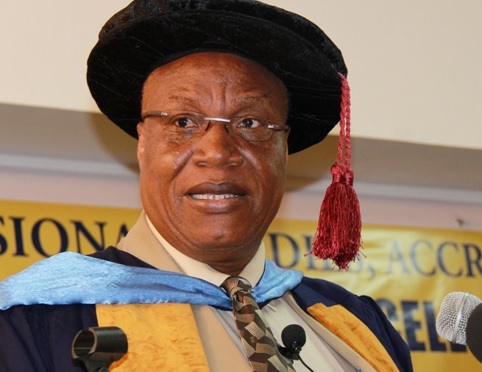
‘What does Ghana want from its tertiary education?’ - Prof Joshua Alabi
A key mover and shaker on the education front, Prof. Joshua Alabi, presented (at the Ghana Academy of Arts and Sciences, Accra, February 23, 2017) an inspiring presentation to the Baraka Policy Institute to help guide policy directives relevant to 21st century tertiary issues.
A transformational leader, a marketing professional, an accomplished academic with credit in leadership in governance, sports administration and entrepreneurship, Alabi was until recently the Vice Chancellor of the University of Professional Studies, Accra (UPSA), training business leaders and professionals in banking, marketing, finance, auditing and management.
Prior to his appointment as Vice Chancellor, he was over twenty (20) years a Lecturer from 1987, the founding Head of the Marketing Department in 1989, the Dean of the Management Faculty from 2003 to 2005, Pro-Rector from 2005 to 2008, and Rector from 2008 to 2012.
The first part of the complete address was published in this column on February 27, 2017, under the main title, “Ensuring inclusive, equitable, quality tertiary education.” The following is the second part of his address (edited):
Which quality do we want?
“Quality is what you want and what works for you. If you want it and it does not work for you, it is not quality. So the question is, what does Ghana want from its tertiary education and what works for it? Do we want employable graduates or graduates with employability skills? Graduates with critical thinking skills that may not necessarily have an immediate use? Graduates with initiative and the drive to create and deliver value for national prosperity? Research that gathers dust on the shelves? Research that is targeted at promotion? Research that results in innovation and advancement and can solve immediate problems?
“Again, Is quality = Standards? or Is Quality = Accreditation? or Is Quality = Number of years a school is under tutelage? Who judges quality of graduates? Is Quality = Number of years students stay in school? Is it industry that judges the quality of graduates, the university or the regulatory bodies or the students themselves?
“A good quality education has been described as one that provides all learners with capabilities required to become economically productive, develop sustainable livelihoods, contribute to peaceful and democratic societies and enhance individual well-being. According to UNICEF, quality education is defined by five elements: 1. Learner's outside experiences, 2. Learning environment, 3. Content of education, 4. Learning processes, and 5. Educational outcomes.
“Currently the quality issues in the tertiary sector include but not limited to the following: Learning environment; Infrastructure and resource issues, particularly human resource issues (Staff / Students Ratio), why the Staff /Students Ratio is low even with only 12 per cent Gross Enrolment Ratio.”
Content / instructional competence
“Generally, is the curricula we have suited to our labour needs? Do we have programmative benchmarks? And if we do, what are the programmatic learning outcomes responsive to labour market needs? Obviously, there is the urgent need for tuning our various curricula to the needs of the labour market.
“For the learning processes, instructional approaches, training and retooling of staff are needed. This does not imply that we do not have quality in our learning processes but we need continual improvement. Currently, there is over-emphasis on research competence over teaching and learning competences as teaching and learning competence is not required for teaching in the tertiary institutions in Ghana. The assumption is that once you can research well, then you can teach.
“Also, the learner’s outside experiences must include internships for both staff and students, industry linkages and international exchanges and exposure.”
Education outcomes
“What are the outcomes expected? Are they linked to national human resource needs? Are there any sound linkages between National Development Agenda and tertiary education outcomes? How do we improve upon this? Generally, how can we make tertiary education work for us? Do we have the relevant labour market data that informs us about the relevant skills and competences that are required over the strategic planning horizon?
“The policy as stated in the ESPR 2015 stresses the following actions as interventions to enhance quality:
• Industry linkages and incubators through operationalisation of a well- functioning Work-place Experience Learning (WEL).
• Review and revision of tertiary curriculum and instructional design and methodologies to make the curriculum more learner-centred, and needs-based.”
Training and retooling of academic staff
“Though these interventions will improve quality of tertiary education in Ghana, we require a transformation of teaching strategies for quality to improve. This will require a complete paradigm shift that will require training and retooling of academic staff to make teaching at the tertiary level more practical and suited to the needs of society. It should also be problem and competency based. Many academics will also need to learn how to facilitate learning, not lecturing.
“A policy requirement that calls for teaching and learning competencies will be required to equip academics with skills in facilitating learning. At the moment, the requirement for teaching in the university is a research master or PhD. The assumption is that once you can research well, you can teach. However at the secondary and primary levels, teaching competences are recognised for differentiated salaries.”
[Next week: The final instalment, on “Funding Tertiary Education”]
